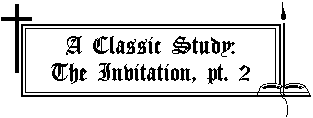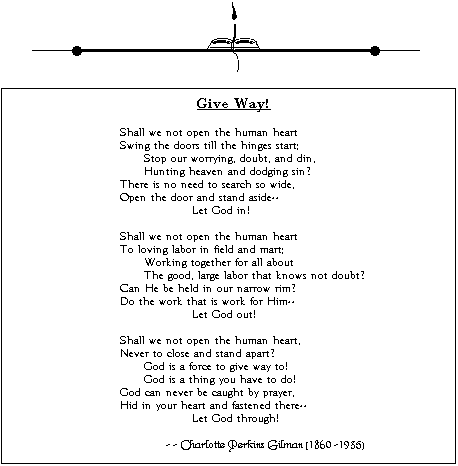
[ Home | Table of Contents | Previous Page | Next Page | Back Issues | Complete Index ]

This is the second article of a three part series, which is a classic study written in 1850 by the Danish philosopher Soren Kierkegaard. The series is an exposition on Christ's "wonderful" invitation in Matthew 11:28. These writings are taken from Kierkegaard's book Indovelse i Christendom, called in English Training in Christianity or Practice in Christianity.-- Ed.
"Come unto Me, all ye that labor and are heavy laden, and I will give you rest" (Matthew 11:28).
What prodigious multiplicity, what almost boundless diversity, amongst the people invited! For a man, even a mere man, can well enough attempt to conceive of some of the individual differences; but the Inviter must invite all, yet every one severally as an individual.
So the invitation fares forth, along frequented roads and along the solitary paths, along the most solitary, aye, where there is a path so solitary that only one knows it, one single person, or no one at all, so that there is only one footprint, that of the luckless man who fled along that path with his misery, no other indication whatsoever, and no indication that in following that path one might return again. Even there the invitation penetrates, finding its own way back easily and surely--most easily when it bears the fugitive back with it to the Inviter. Come here, all you--and you, and you. . .and you, too, most solitary of all fugitives!
Thus the invitation fares forth, and wherever there is a parting of the ways it stops and calls aloud. Like the trumpet-call of the warrior which turns to all four quarters of the world, so the invitation resounds wherever there is a parting of the ways--and with no uncertain sound (for who then would come?) but with the unequivocal sureness of eternity.
It halts at the crossways, where suffering temporal and earthly has planted its cross, and there it calls aloud. Come here, all ye poor and miserable, ye who in poverty must toil to ensure for yourselves not a carefree but a toilsome future. Oh, bitter contradiction--to have to toil to attain what one groans under, what one flees from!--Ye who are despised and disdained, about whose existence none is concerned, not a single one, not even so much as for the beasts, which have a higher value!--Ye sick, lame, deaf, blind, crippled, come here!--ye bedridden, yea, come ye also here! For the invitation makes bold to bid the bedridden: come!--Ye lepers! For the invitation abolishes every barrier of difference in order to bring all together. It proposes to make amends for the inequalities chargeable to the difference which allots one a place as a ruler over millions, possessing all the favors of fortune, and relegates another to the desert. And why? (Oh, the cruelty of it!) Because (oh, cruel human logic!), because he is miserable, indescribably miserable; consequently for this further reason, because he craves help, or at least compassion; and consequently for this further reason, because human compassion is a paltry invention, cruel where the need of compassion is most evident, and compassionate only where in a true sense it is not compassion!--Ye sick at heart, ye who only through pain learn to know that a man has a heart in a sense quite different from the heart of a beast, and learn what it means to suffer in that part, learn how it is that the physician may be right in declaring that one's heart is sound while nevertheless he is heart-sick. Ye whom unfaithfulness deceived, and then human sympathy (for human sympathy is seldom in delay) made a target for mockery. All ye who have been discriminated against, wronged, offended, and ill-used; all ye noble ones who (as everybody can tell you) deservedly reap the reward of ingratitude. For why were ye foolish enough to be noble, why stupid enough to be kindly, disinterested, and faithful? All ye victims of cunning and deceit and backbiting and envy, whom baseness singled out and cowardice left in the lurch, whether ye be sacrificed in remote and lonely places whither ye have crept away to die, or whether ye be trampled under foot by the thronging human crowd where no one inquires what right ye have on your side, no one inquires what wrong ye suffer, or where the smart of your suffering is, or how ye smart under it, while the throng, replete with animal health, tramples you in the dust--come here!
The invitation stands at the parting of the ways where death separates life and life. Come here, all ye sorrowful, all ye that travail in vain and are sore troubled! For it is true that there is rest in the grave; but to sit beside a grave, to stand by a grave, or to visit a grave, all that is not yet to lie in the grave; and to scan again and again the production of one's own pen, which one knows by heart, the inscription which one placed there oneself and which the man himself can best understand, telling who lies buried there--that, alas, is not to lie buried there oneself. In the grave there is rest, but beside the grave there is no rest--the meaning of it is: hitherto and no farther . . . then one can go home. But often as you return to that grave, day after day, whether in thought or on foot--one gets no farther, not one step from the spot; and this is very exhausting, far from expressing rest. Come ye therefore here, here is the path along which one goes farther, here is rest beside the grave, rest from the pain of loss, or rest in the pain of loss--with Him who eternally reunites the separated, more firmly than nature unites parents and children, children and parents (alas, they were parted), more inwardly than the priest unites husband and wife (alas, separation occurred), more indissolubly than the bond of friendship unites friend with friend (alas, that was dissolved). Separation everywhere forced its way between, bringing sorrow and unrest; but here is rest!--Come here, ye whose abodes were assigned to you among the tombs, ye who are accounted dead to human society, yet not missed and not mourned--not buried, although dead, that is, belonging neither to life nor to death; ye, alas, to whom human society cruelly closed its doors, and yet for whom no grave mercifully opened--come ye then here: here is rest and here is life!
The invitation halts at the parting of the ways where the path of sin deviates from the hedged road of innocence--Oh, come here, ye are so near to Him; a single step on the other path, and ye are so endlessly far from Him. It may well be, perhaps, that ye have not felt as yet the need of rest, and hardly understand what it means; yet follow nevertheless the invitation, so that the Inviter might save you from a state which only with great difficulty and peril ye might be saved out of, so that as the saved ye might abide with Him who is the Saviour of all men including the innocent. For if it were possible that somewhere there might be found innocence entirely unsullied, why should it not also require a saviour who could preserve it safe from the evil one?-- The invitation halts at the parting of the ways where the path of sin veers more deeply into sin. Come here, all ye that have strayed and lost your way, whatever your error and sin may have been, whether it be one which in human eyes was more pardonable and yet perhaps more dreadful, or one more dreadful in human eyes and yet perhaps more pardonable, one which was revealed here on earth, or one which is concealed here yet known in heaven--did ye find forgiveness here on earth and yet no rest in your inward mind, or found ye no forgiveness because ye sought it not, or sought it in vain--oh, turn about and come here, here is rest!--The invitation halts at the parting of the ways where the path of sin again veers, for the last time, and is lost to view--in perdition. Oh, turn about, turn about, come here! Shrink not at the difficulty of the journey back, however hard it be; fear not the toilsome path of conversion, however laboriously it leads to salvation, whereas sin with winged speed, with ever-increasing velocity, leads onward . . . or downward, so easily, with such indescribable ease, as cannot with all his might bring the wagon to a halt which thrusts him patience possesses patience enough to forgive and which a sinner might well have patience enough to be humbled under. Nay, fear nothing and despair not. He who says, "Come here," is with you on your way; from Him come help and forgiveness in the path of conversion which leads to Him; and with Him there is rest.
Come here all, all, all of you, with Him is rest, and He makes no difficulties, He does but one thing, He opens His arms. He will not first (as righteous people do, alas, even when they are willing to help)--He will not first ask thee, "Art thou not after all to blame for thy misfortune? Hast thou in fact no cause for self-reproach?" It is so easy, so human, to judge after the outward appearance, after the result--when a person is a cripple, or deformed, or has an unprepossessing appearance, to judge that ergo he is a bad man; when a person fares badly in the world so that he is brought to ruin or goes downhill, then to judge that ergo he is a vicious man. Oh, it is such an exquisite invention of cruel pleasure to enhance the consciousness of one's own righteousness in contrast with a sufferer, by explaining that his suffering is God's condign punishment, so that one hardly even . . . dares to help him; or by challenging him with that condemning question which flatters one's own righteousness in the very act of helping him. But He will put no such questions to thee, He will not be thy benefactor in so cruel a fashion. If thou thyself art conscious of being a sinner, He will not inquire of thee about it, the bruised reed He will not furnther break, but He will raise thee up if thou wilt attach thyself to Him. He will not single thee out by contrast, holding thee apart from Him, so that thy sin will seem still more dreadful; He will grant thee a hiding-place within Him, and once hidden in Him He will hide thy sins. For He is the friend of sinners: When it is a question of a sinner He does not merely stand still, open His arms and say, "Come here"; no, He stands there and waits, as the father of the lost son waited, rather He does not stand and wait, He goes forth to seek, as the shepherd sought the lost sheep, as the woman sought the lost coin. He goes--yet no, He has gone, but infinitely farther than any shepherd or any woman, He went, in sooth, the infinitely long way from being God to becoming man, and that way He went in search of sinners.
(We will conclude Kierkegaard's study in the next issue.)

[ Home | Table
of Contents | Previous Page | Next
Page | Back Issues | Complete
Index ]